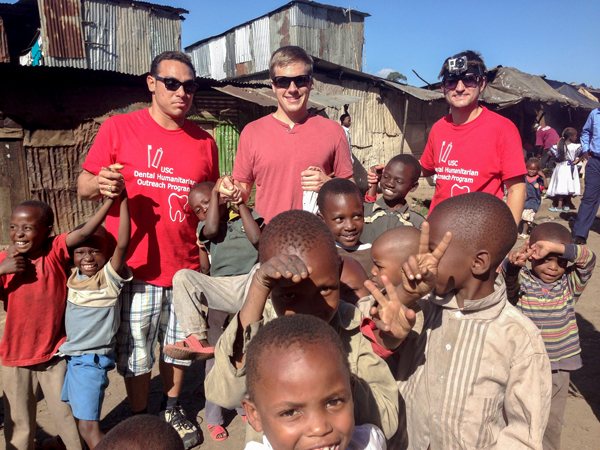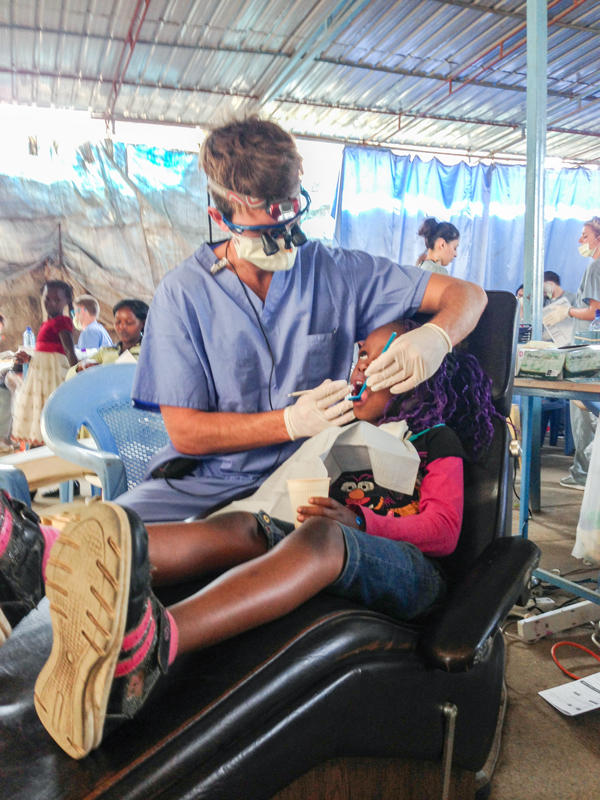Ostrow Students and Faculty Serve Kenyans in Need

Posted
04 Jan 13
The following article is a firsthand account courtesy of Professor Mary Ellen Toffle of the University of Messina, Italy, and the USC Dental Humanitarian Outreach Project.
The line extends out the door into courtyard and into the dusty slum street. Women, children, babies, toddlers all clean and shining in their best clothes wait patiently; a couple of old grandmothers in traditional dress holding their mouths move to the front. Some men shift uncomfortably from one foot to the other trying to put on a brave face. Mothers sit with small children on their laps. Two little boys experiment with the dental floss that they have just received. Little girls with braided hair in school uniforms watch wide-eyed at the Mzungu (white people) coming and going with charts. Small boys and girls crowd around a young volunteer who is holding a stuffed lion with a full set of dentures as they take turns learning the proper way to brush teeth with the gigantic toothbrush. A tiny boy holding his chart is greeted by a dental student in scrubs, who kindly reassures him and escorts him over to a dental chair designed and made in Nairobi – brown and black like many of the traditional cloths.
The open-air structure with one wall and three curtains that usually serves as a church has found a new function: it has been transformed overnight into the most modern dental clinic in Africa. Fifty-one dental professionals are busily working in four USC mobile dental units and a special clinic created from a converted office. Kenyans of all ages are lying on dental chairs as young student dentists decked out in head lamps and magnifying eyeglasses carefully install rubber dams in preparation to treat problems including infection, gum disease, and decay.
Welcome to the USC Dental Humanitarian Outreach Program in Nairobi, Kenya.
The USC Dental Humanitarian Outreach Program is a nonprofit, student-run organization that organizes multiple trips per year to serve the dental needs of poor communities in places such as Colombia, Honduras, and now Nairobi, Kenya. It provides cleanings, restorations, and extractions in an effort to curb oral disease in these severely underserved populations.
Sean Vreeburg, USC DDS 2014, says the goal is to “provide the same standard of care as what we provide at the University of Southern California in the United States.” DHOP was started in 2008 as a branch of the Dental Unit of the Global Medical Brigades. It broke off and became a separate organization run through USC. Vreeburg and DDS 2014 classmate Marco Savittieri are the co-founders and co-presidents of the present organization. They have changed it from a club to an outreach humanitarian organization fully developed with a constitution, bylaws and a board of directors.
“It has been growing each year through donations of supplies, equipment, and financial assistance, which has enabled us to go farther and treat more patients,” Vreeburg says as he directs dental students towards their mobile dental units. “The Kenya project is the largest so far.”
In addition to sharing the management, planning, and logistics, Vreeburg functions as country liaison and sets up the international projects whereas Savittieri is responsible for mobilizing and organizing the students who participate in the projects. In addition to humanitarian outreach, the organization also offers advanced dental education and other opportunities. The humanitarian outreach projects have grown from 10 people in 2010 to 50 in 2012.
The current project in Kenya, believed by the Kenya Ministry of Medical Services to be the largest dental outreach effort in the country’s history, took 10 months to organize, which proved challenging since both Vreeburg and Savittieri are full time dental students. Fortunately, a fellow student had already lived in Kenya and was able to advise and assist with important connections as well as deliver pre-departure cross-cultural training.
Realizing the goal of 51 dental professionals and 37 support people spending a week in the second largest slum in Nairobi wasn’t easy, however. Stateside challenges included risk management issues due to the recent bombing in Nairobi. This fact caused difficulties in the university approval process of the project. After very stringent risk analysis and additional security measures, plus various vaccinations against hepatitis A, yellow fever, typhoid, and polio, the group was able to depart on time.
But that was not the end; all the bags containing the USC mobile dental unit equipment didn’t arrive for two days. Another setback happened when a transformer blew out and an entire area of Nairobi was blacked out due to the project’s power use. The organizers had to go out and purchase a new generator for $1500 on the spot.

The multicultural dental team is made up of young people with cultural origins from many parts of the world. Besides the US, the highly organized team members hail from Cuba, Taiwan, Iran, Mexico, Lebanon, Nicaragua, Korea, Japan, India, Jamaica, China, and Vietnam, all functioning together to meet the dental needs of the people of the Mathare slum. The dental students are mostly from the second, third and fourth year, with a few select first year students. The students are supported by the generous participation of six dentists, including four from USC: Dr. Garner Beale, Dr. Sanaz Fereshteh, Dr. Alain Toca, and Dr. Koren Borland.
Two other dentists have generously donated their time and expertise: Dr. Robert Weinstein, a private practice oral surgeon, and Dr. Mike Hyodo, Director of World Ministries International, who runs dental clinics in Nairobi. In addition to the dental professionals, the project is being hosted by Mary Kamau and her husband Wallace Kamau, founders and directors of Mission of Hope International partnered with Christian Ministries Fellowship. They arranged the location; set up all the accommodations six months in advance; booked buses, security, and eating arrangements; and pre-screened the patients.
The cost of the project is more than $130,000, which is actually quite low considering the magnitude of the project; this is due to the generous donation of services, time, and materials. According to Vreeburg, a partnership with Crest assisted in raising half the funds, while the students themselves paid the other half. USC and Dr. Michael Hyodo loaned the dental equipment. Dr. Hyodo provides dental care as part of his ministry in Kenya and was instrumental in the success of this project.
Vreeburg goes on to say “We are doing everything by USC standards. The same sterilization and instrument treatment, every patient has x-rays, the treatment plans are checked by faculty, cleaning is verified by faculty, multiple checks — all the same procedure as in USC.”
The majority of the patients are local children experiencing their first dental visit; more than 95% of the adults treated have never received any kind of dental treatment. The team leaves by 7:00 in the morning for the long bus ride to the slum and begin working immediately on arrival. They have been putting in nine-hour days and would work later but for the fact that the area is very dangerous and the mission itself closes. They were advised not to work after dark.
Six huge boxes of toothbrushes, toothpaste, and dental floss wait at the intake area for distribution. Children and adults eagerly accept the gift and ask for additional items for their other family members. The high demand is not a problem since the organization brought over 15,000 toothbrushes donated by local dental supply companies.
It would be difficult to find a clinic better organized and set up. As Vreeburg proudly points out, “USC protocol for mobile dental units is being carried out here just as in the US. We are proud to offer the best quality available in the world.”